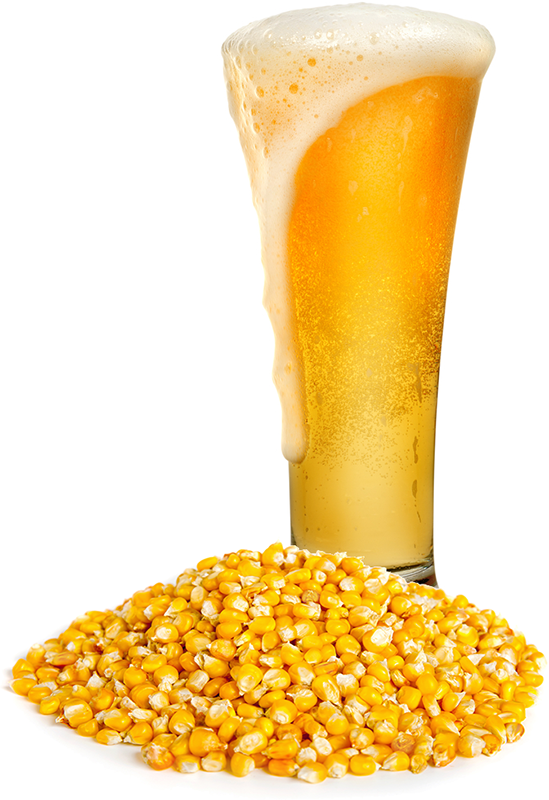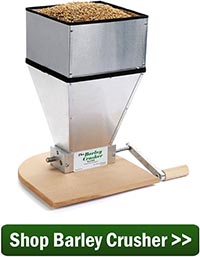 Corn, also known as maize, is most frequently used in brewing as an adjunct grain to lighten beer body, color, and flavor. Though the macro brewers bastardized its use to some extent, today’s craft brewers may find that using corn in beer has its place. Some styles (cream ale, for one) have found a home among brewers who hope to demonstrate that it is possible to make artistic, flavorful beer with maize.
Corn, also known as maize, is most frequently used in brewing as an adjunct grain to lighten beer body, color, and flavor. Though the macro brewers bastardized its use to some extent, today’s craft brewers may find that using corn in beer has its place. Some styles (cream ale, for one) have found a home among brewers who hope to demonstrate that it is possible to make artistic, flavorful beer with maize.
Corn actually played a significant role in brewing long before the modern craft beer revolution. Foreseeing the need for a potable beverage, the earliest European settlers carried malt with them to the New World. But when that ran out, they often turned to brewing beer with corn. Malting maize turned out to be quite a challenge, but the determined settlers found a way to make it work — two ways in fact, as shared in the book Brewed in America.
The easiest method was to bake copious amounts of corn bread. When it came time to make beer, the brewers would just toss the loaves right in the mash tun to make wort! This avoided the process of malting the maize, which turned out to be more difficult than malting barley or wheat.
For those determined to malt the local maize, they found that the best way to do this was to dig a large hole in the ground, wait for the corn to sprout, dig it all up again, wash it, then kiln it. Clearly these settlers were desperate for beer!
Even before the colonists arrived in the New World, chicha was brewed in South America among the Peruvian Incas. Dogfish Head’s Sam Calagione attempted a chicha, and while the end result doesn’t sound very authentic, it’s definitely entertaining to read about.
Of the craft brewers making beer with corn, one in particular stands out. Charlottesville, VA’s Starr Hill Brewing Company researched what Thomas Jefferson might have brewed at Monticello and developed a beer recipe for their limited release Monticello Reserve Ale. Flaked corn is used for a touch of sweet corn flavor, but it’s not at all overwhelming. The beer won a Silver Medal at the 2011 Great American Beer Festival.
Methods for Brewing Beer with Corn
Because corn has a higher gelatinization temperature than barley, it must be cooked prior to mashing. Malting corn is a difficult process and as a result, most brewers will use one of the three forms below:
- Flaked Maize – Flaked maize can account for as much as 20-40% of the total grain bill, depending on the style. The corn is pressed through hot rollers, so the flakes can be added directly to the mash without prior cooking.

- Corn Grits – Corn grits must be cooked in a separate vessel before being added to the mash. Otherwise, use them in the same way as flaked corn.
- Corn Sugar – Most commonly used as priming sugar, corn sugar can also be added to the kettle to increase alcohol content without significantly affecting body, color, or flavor. I wouldn’t advise using more than a pound in a five-gallon batch, two at the most, otherwise your beer may become thin and cidery.
Interested in brewing beer with corn or maize? Consider the Brewer’s Best Cream Ale Recipe Kit.
—–
David Ackley is a beer writer, brewer, and self-described “craft beer crusader.” He holds a General Certificate in Brewing from the Institute of Brewing and Distilling and is founder and editor of the Local Beer Blog.

Why is it hard to malt corn? It is pretty easy to sprout it. Does it need to be malted to make the sugars somehow available for conversion by the barley malt in the mash?
Garth, the malting corn or barley is not an easy process. You let the corn sprout/germinate, then roast from germination and you can let it go too far. the timing of the process is why this is mostly left up to the malting houses.
Tried using it twice now for a simple lager, just 2 row and flaked corn(10% of GB). Both times I’ve had a stuck sparge, is this normal? Beers turned out great but I think next time I’m going to try putting the flaked corn in a couple of muslin bags to keep it contained.
add 10% rice hulls to stop the struck sparge.Add that in before the main grainbill and it’ll help with the vorlauf.
Can I use the water from boiling corn on the cob in with my malt and hops boil?
I would not recommend it. While there is definitely some starch in the water that can convert to a fermentable sugar, the amount is so small as not to be worth the effort.